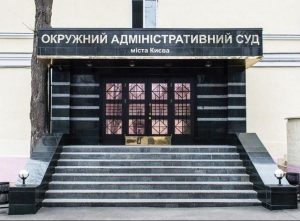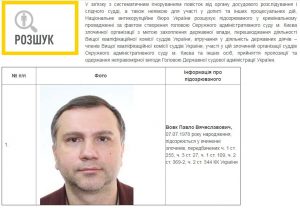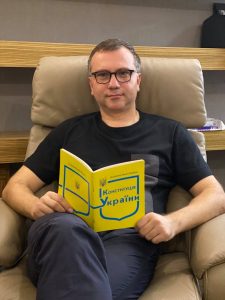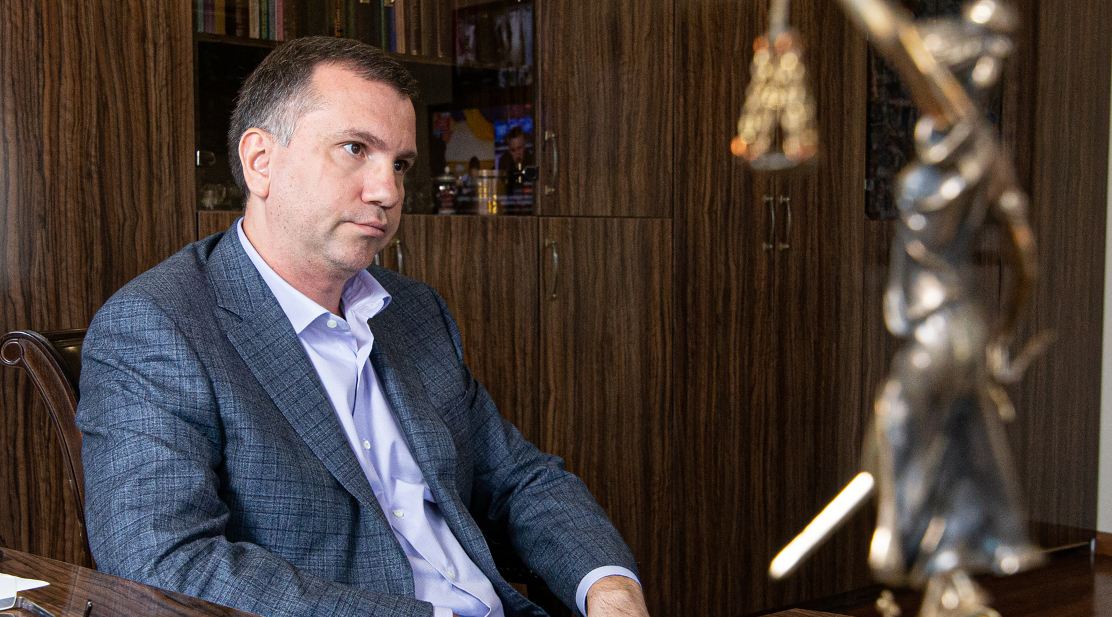Pavlo Vovk is one of the best-known judges among Ukrainians. As the head of the Kyiv District Administrative Court, he was behind multiple controversial decisions and the national anti-graft watchdog suspects him of plotting the seizure of power. But instead of leaving office and being tried, the odious judge can boost his powers even more.
Compared to other Ukrainian courts, the Kyiv District Administrative Court (KDAC) led by judge Pavlo Vovk quite often makes headlines with its scandalous decisions.
These are only a few examples of such judgments:

- In November 2013, the police anti-riot unit Berkut used the Court's ruling as justification to violently disperse students on the independence square who had been protesting against Yanukovych's decision to postpone signing the Association with the EU, which sparked mass rallies that toppled Yanukovych a few months later.
- In 2017, KDAC judges recognized as legitimate the Internal Affairs Ministry's purchase from a company owned by a son of Minister Arsen Avakov - so-called "Avakov's backpacks case" which helped the minister to avoid punishment.
- In 2018, KDAC reinstated Fiscal Service head Roman Nasirov charged with corruption as head of Fiscal Service. The corruption watchdog - the National Anti-Corruption Bureau of Ukraine (NABU) - stated that Nasirov's actions caused 2 bln UAH ($72 mln) in losses for the state.
- In early 2019, this court suspended the reform-minded acting Health Minister, Ulyana Suprun, from performing her duties.
- In April 2019 року, KDAC ruled that the nationalization of oligarch Kolomoyskyi's Privatbank was illegal.
Vovk
[box-right]There are two odious Ukrainian judges bearing the same last name of Vovk, whom many Ukrainians, including journalists, often mistake for one another. One of them is Serhiy Vovk of the Kyiv Pechersk District Court, and the other one is Pavlo Vovk of the Kyiv District Administrative Court. This article is about Pavlo Vovk. The two aren't relatives, but they share the same family name, both serve as judges at high-profile Kyiv courts, and both Vovks have a similar reputation for their decisions often described as "scandalous" in the press. [/box-right]
Judge Pavlo Vovk became the head of the Kyiv District Administrative Court back in 2010 as the High Council of Justice controlled by allies of then-President Viktor Yanukovych appointed him to this post. Vovk has been heading the court for more than 10 years, he survived multiple attempts to remove him from office by the NABU, post-Maidan President Petro Poroshenko, and anti-corruption activists.
[boxright]
READ ABOUT THE TAPES HERE:
Ukraine’s new anti-corruption bodies lock horns with deep state over rotten court
[/boxright]
In the summer of 2019, the National Anti-Corruption Bureau published tapes recorded in the offices of KDAC judges in February-May 2019.
Based on the obtained data, the agency accused Vovk and three other judges of attempting to influence the decisions of the High Qualification Commission of Judges, the Constitutional Court, the Supreme Council of Judges (SCJ), and various ministries. Later the case was transferred to the Security Service of Ukraine (SBU) and stalled there.
A year later, in late July 2020, NABU released wiretapped recordings from Vovk's office, and the materials allegedly showed that judge Vovk not only headed his Court, but also influenced many government agencies, politicians, and officials. The agency said that it had about 1,000 hours of recorded conversations in total.
NABU handed over its notices of suspicion to Pavlo Vovk and six more judges from his court. This time the charges have been more serious than a year ago, including an attempt to seize power by an organized criminal group allegedly led by judge Pavlo Vovk.
Wanted by NABU
On 29 October, for the second time in a row, Pavlo Vovk and his defense fully ignored a court hearing where a preventive measure was going to be chosen for Vovk. Due to the absence of the defendant, the hearing was postponed to 5 November.

On 3 November, the National Anti-сorruption Bureau of Ukraine (NABU) Tuesday put Pavlo Vovk on the wanted list.
Detectives of the agency note that the reasons for putting the head of the Kyiv District Administrative Court on the wanted list were his "systematic disregard of [interrogation] summonses from the pre-trial investigation body and the investigating judge" and his failure to report for questionings and other procedural actions.
The warrant notice also says that Pavlo Vovk has been a suspect in a NABU investigation into
"the creation of a criminal organization by the head of the Kyiv District Administrative Court aiming at the seizure of state power."
The investigators allege that the organization could have obstructed the activities of the High Qualification Commission of Judges of Ukraine - the judicial body that appoints and dismisses judges, interfered in the activities of statesmen, namely of the Commission members.
The prosecutors' theory is that the group comprised of judges from Vovk-led Kyiv District Administrative Court and "other people."
Vovk's excuses
Hours after putting judge Pavlo Vovk on the wanted list, his court published a statement claiming that Vovk was on medical leave.
"We inform you that the chairman of the District Administrative Court of Kyiv Pavlo Vovk has been on medical leave since 2 November 2020, self-isolating due to his COVID-19 disease. Volodymyr Keleberda, his deputy, performs the duties of the chairman of the court," the statement reads.
Therefore, says KDAC, the NABU's information on Vovk systematically ignoring summonses is obviously not true. Moreover, the court slams NABU by saying
"Once again, we emphasize the need for NABU employees to comply with current legislation and avoid resorting to regular PR campaigns, hoping to disseminate manipulative information in the media," the statement says.

On his Facebook page, Pavlo Vovk also shared a photo of himself holding the Constitution of Ukraine and commented,
"Greetings from the wanted list! I am on medical leave. I am carefully looking for an exception from Article 19 of the Ukrainian Constitution to justify what is happening."
The 19th article of the Constitution he refers to, reads,
"Bodies of state power and bodies of local self-government and their officials are obliged to act only on the grounds, within the limits of authority, and in the manner envisaged by the Constitution and the laws of Ukraine."
Previously, in late August 2019, NABU had already put Vovk and six of his colleagues on the wanted list, and the Prosecutor General sent a motion to the Supreme Council of Justice to deprive Pavlo Vovk of his functions of administering justice in connection with criminal prosecution.
However, Vovk told the Council that he was on "valid vacation" at the time and the judiciary body found his excuses sufficient to dismiss the PG's motion since under Ukrainian laws a person can't be fired while on vacation or medical leave.
Vovk can boost his influence
Instead of leaving office and being tried, the odious judge can boost his powers even more. On 5 November the Verkhovna Rada (Parliament) is going to consider a bill that would indirectly transfer control over the selection of judges to Pavlo Vovk's Kyiv District Administrative court.
The bill submitted by President Zelenskyy in June was meant to unblock the appointment of new judges, suspended due to the opposition from the Supreme Council of Judges to forming the new composition of the High Qualification Commission of Judges (HQCJ) - the body that selects new judges and re-certifies those in office. The Rada dissolved the commission last year and it was never formed again since then, which resulted in a growing shortage of new personnel among the judicial authorities.
The presidential draft law intends to revive the judicial reform by cleansing the composition of the SCJ. Zelenskyy's bill envisages that a Competition Commission comprised of international experts would form the HQCJ. However, DEJURE Foundation warns, if international organizations refuse to delegate their representatives to the Commission which was a case before, then according to the proposed legislation, the HQCJ composition gets formed by the Parliament's ombudsperson, who has been controlled by Pavlo Vovk's court that has been considering several cases against the commissioner. Moreover, Pavlo Vovk admitted his influence on the ombudsperson in one of his conversations, wiretapped by NABU.
The situation with Pavlo Vovk and the Kyiv District Administrative court clearly shows the ramifications of unfinished reforms of the judiciary system in Ukraine, when Yanukovych-times judges can just ignore any criminal investigations against them and continue their activities as the judiciary bodies keep covering them in their seats.
Further reading:
- Constitutional Court torpedoes Ukraine’s anti-corruption reform
- Ukraine’s new anti-corruption bodies lock horns with deep state over rotten court
- Ukraine ponders ways to stop “legal terrorists” in Constitutional Court
- Corrupt and biased judges still pollute Ukraine’s judiciary; Zelenskyy’s reform will not fix that
- Ukraine’s judicial reform stumbles with odd Constitutional Court rulings
- Court decision on Privatbank proves Ukraine’s judicial reform was failed. Here’s how to fix it
- Recent outrageous decisions of Ukrainian courts prove Zelenskyy inherits limping judicial system
- Despite second attempt at judicial reform, political decisions rule Ukrainian courts
- Judicial reform 2.0: Zelenskyy comes with initiatives only partly supported by society
- Judiciary reform under threat because of the old new Supreme Court (2017)

